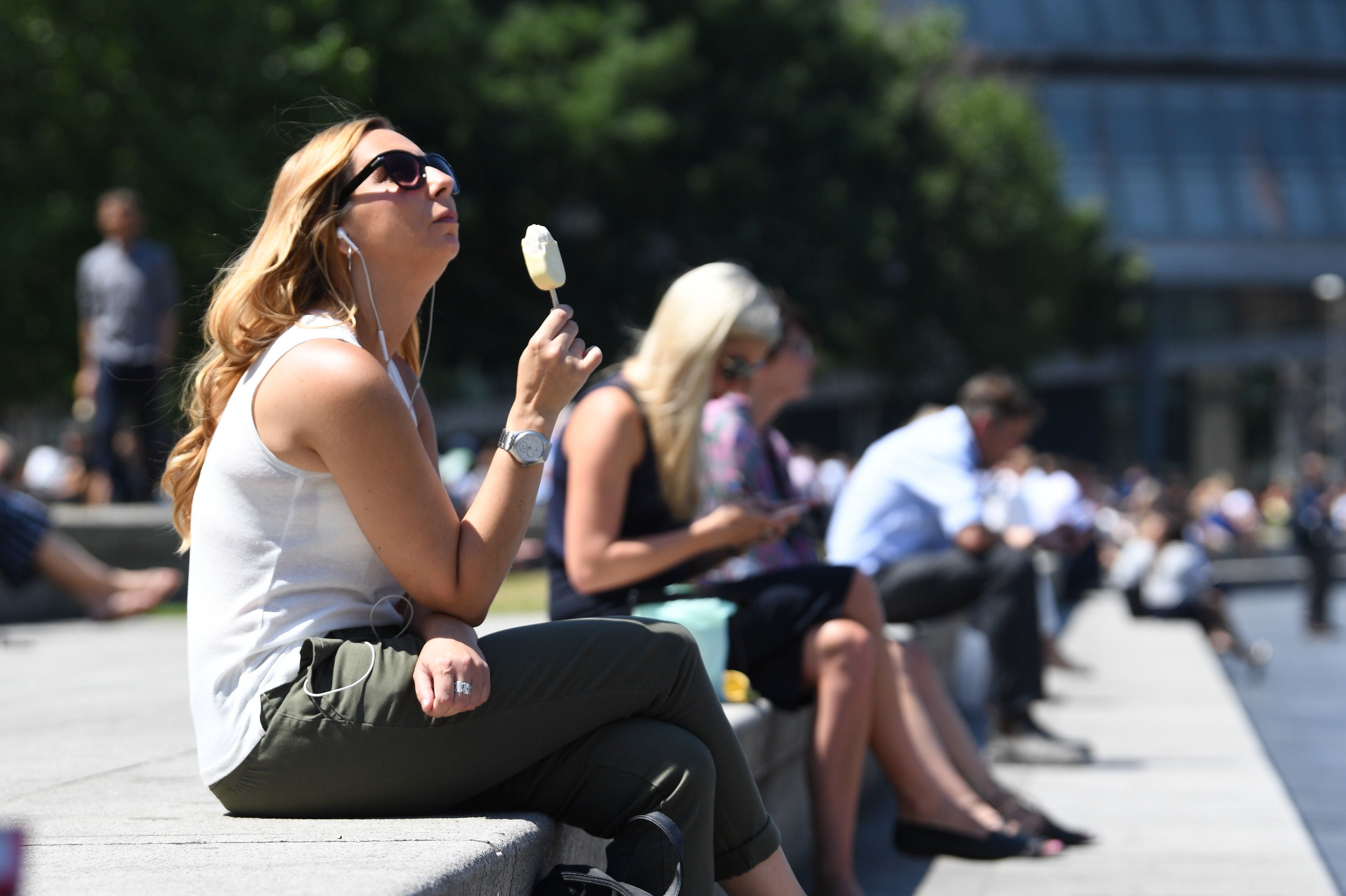Assist trulyindependent journalism
Our mission is to ship unbiased, fact-based reporting that holds energy to account and exposes the reality.
Whether or not $5 or $50, each contribution counts.
Assist us to ship journalism with out an agenda.
Discover out extra
Is there something extra quintessentially British than complaining concerning the climate? A fortnight in the past we have been griping that it was too chilly. This week we’re grumbling that it’s too sizzling. We’re mainly Goldilocks at this level.
In the course of the sizzling climate the UK has endured this week, I couldn’t assist however really feel a flicker of guilt each time I bemoaned that my garments have been caught to my body with sweat as I travelled on the tube, or that my high-energy Zumba class was nigh-on insufferable within the unaired warmth of the native sports activities centre. What proper did I – did any of us – must complain, after months of carping concerning the washout that was April, Could and most of June? Absolutely we should always merely recognize the reward of some days of solar and the mercury lastly rising to a suitable stage?
This guilt was additionally tinged with embarrassment. Let’s be frank – it hasn’t even been that sizzling. We’ve barely pushed above 25C. The remainder of the world have to be laughing at us, wilting in temperatures a full 10-15C under what they’d contemplate spicy.
However then a latest Twitter/X thread by an American explaining that, actually, the UK wasn’t a nation of whole pansies caught my eye and assuaged my disgrace.
“I’m gonna clarify to y’all why Britain considers 78F/25C sizzling,” wrote Josh Ellis. “I do know sizzling as a result of I grew up in Texas and spent half my life in Las Vegas. So I’m completely certified to clarify this to the remainder of you who snicker at UK ‘heatwaves’.”

open picture in gallery
He went on to hypothesise that humidity performed a big function in Britain feeling hotter than its modest temperatures would recommend: “l’m outdoors proper now and it’s 76F [24C] and 53 per cent humidity and it seems like I’m in a sauna. Thank God the clouds are out as a result of earlier it was actually disagreeable. Perceive me after I let you know I’m used to warmth most of you’ll be able to’t think about. That is nonetheless nasty and gross to me.”
His concept has legs, Jim NR Dale, senior meteorologist at British Climate Providers and co-author of Surviving Excessive Climate, tells me. “You’ll be able to go to a desert that’s over 30C in, say, Tunisia, and it’s extremely popular nevertheless it’s a dry warmth,” he says. “Whereas right here, if we get humidity into the environment as we’ve seen over the previous couple of days, that combination could be very totally different. With humidity, we expertise the shortcoming to lose sweat from the pores and skin’s floor to chill us down in a pure means.”
Dr Simon Keeling of Climate Consultancy Providers agrees that the humidity has been excessive “and that’s why it’s feeling a lot hotter than the recorded temperatures in the mean time. If the air have been drier, then the warmth would really feel much more snug, somewhat prefer it does once you go into Europe with temperatures of 30 to 35C and, though it’s sizzling, it actually doesn’t really feel that uncomfortable.”
It’s the identical purpose warmth in tropical climates similar to Thailand and Malaysia feels a lot harder to endure than dry, desert international locations within the Center East and north Africa. “It’s not as dangerous right here as in south Asia, however nonetheless, due to that injection of moisture within the environment, it feels uncomfortable – like you’ll be able to’t do something,” says Dale. “Even in your individual house you’ll be able to nonetheless really feel that humidity. It induces a lazy, languid, sleepy feeling.”
With humidity we expertise the shortcoming to lose sweat from the pores and skin’s floor to chill us down in a pure means
Jim NR Dale, senior meteorologist
He additionally places it right down to Brits’ lack of expertise in the case of excessive temperatures – sizzling or chilly. “We reside in a temperate local weather and so clearly we cope much less properly when temperatures are excessive in both route; we’re not used to it,” he provides.
However our infrastructure additionally performs a serious half in making the UK appear sweltering. Our buildings and transport techniques weren’t initially designed with cooling in thoughts. “The homes are constructed to retain warmth, not flow into breezes,” tweeted Ellis. “The local weather has at all times been coldish-cool and it’s loopy humid. Like Florida humid. It rains loads. The closest local weather to it I’m acquainted with is Seattle. Know what individuals in climates like that don’t have? Air con. They didn’t want it till just lately.”
The World Financial Discussion board revealed a warning in 2022 that UK infrastructure is “underneath risk” when coping with temperatures it’s unequipped to deal with. Presently, 20 per cent of current infrastructure is vulnerable to overheating, and this “will rise as common temperatures proceed to extend”. And this isn’t simply referring to buildings, however rail, street, water pipes, our electrical energy grid… In the meantime, the UK and Switzerland are two of the international locations that have to adapt essentially the most for world heating, scientists have predicted, with each more likely to see a 30 per cent enhance within the variety of days of uncomfortably sizzling temperatures if the world heats by 2C.
Whereas the UK has an enormous range in the case of housing inventory, a selected situation is new-build flats in cities, says Dr Ben Roberts, a lecturer in constructing power at Loughborough College who specialises in mitigating the dangers of utmost warmth. “Flats are typically essentially the most high-risk dwelling varieties,” he says. It could possibly be as a result of they’ve much less probability to cross-ventilate – you often can’t open home windows on totally different sides of the constructing to let air movement by – and the constructing designs themselves don’t assist. Huge home windows, although they could look flash in architects’ plans, are a nightmare in the case of maintaining flats cool. Floor ground flats have safety points in the case of leaving home windows open in a single day; high ground flats are much less shaded and will sit underneath an uninsulated flat roof the place the solar beats down all day, whereas warmth additionally rises from under.

open picture in gallery
“We’re seeing extra individuals transfer in the direction of cities, so flats have gotten extra frequent,” provides Dr Roberts. “And cities are hotter anyway within the city warmth island.”
This refers back to the impact whereby huge cities and cities, filled with much more concrete and tall buildings than rural areas, take up warmth in the course of the day and radiate it again out when the solar goes down, “stopping temperatures falling as they could have used to do in a single day”, says Dr Keeling. “That additionally implies that the bottom temperature within the morning to start out the day is greater and so daytime temperatures can rise greater too.”
So, is air-con the reply? Solely round 5 per cent of UK households at present have AC, in comparison with 90 per cent of the US. The pressure it could placed on the ability grid have been each property to get aircon can be monumental at a time after we’re making an attempt to cut back our electrical energy consumption. One 2021 authorities report predicted that AC use might spike the UK’s power use by as much as 15 per cent in the course of the summer time by the 12 months 2100. “The electrical energy grid might not deal with mass aircon,” warns Dr Roberts. “We’d want to strengthen the grid to deal with that form of demand.”
Although he concedes that within the subsequent hundred years the local weather might have warmed to the extent that AC could possibly be a necessity, notably in cities the place points round noise and safety imply it’s not viable to ventilate buildings, he’s cautious of potential gas poverty. “We might have a problem the place we’ve summer time gas poverty as a result of AC is dear to run,” he argues. “So we actually ought to take each passive measure we are able to earlier than transferring to AC.” (To not point out the truth that AC produces the very carbon emissions accountable for the worldwide warming that necessitates AC use within the first place.)
We might have a problem the place we’ve summer time gas poverty as a result of AC is dear to run
Dr Ben Roberts
Passive cooling can contain easy measures, with a lot of it (excuse the pun) boiling right down to the triple risk of shading, insulation and air flow. Dr Robert sums it up thus: “Overheating is easy – don’t let warmth in within the first place and, if it does get in, be sure you can get it out once more. It’s only a warmth stability.” Meaning taking steps like investing in exterior shading that stops warmth getting in; correct insulation and thick partitions that, conversely, maintain warmth out as a lot as they maintain it in; and air flow that releases the warmth that’s gathered again out once more.
The federal government acknowledged that overheating was a urgent downside and up to date constructing rules in 2022 accordingly, stipulating that overheating of newbuilds must be prevented by higher design (similar to eschewing these large home windows beloved by architects). In London, following 2022 excessive summer time temperatures that rose to over 40C, mayor Sadiq Khan pledged £3.1m for a new tree-planting package deal to future-proof the town and assist maintain it cool by shading and evapotranspiration (the motion of water from land into the air).
Need to calm down earlier than these potential future measures kick in? The consultants’ remaining recommendation is, counterintuitively, to maintain your home windows shut in the course of the day. “It’s the fallacious factor to open your home windows, positively,” says Dr Roberts. And he ought to know – he did an entire PhD when to open them. “If it’s hotter outdoors than inside, your home windows must be closed, as a result of all you’re doing in any other case is letting sizzling air in. We encourage evening air flow – there’s a build-up of warmth in the home in the course of the day, and a drop in temperature outdoors at evening.” Should you can, open your home windows once you go to mattress – as many as doable to get a cross-breeze going and air circulating – and shut them once more once you get up within the morning.
And be happy to maintain complaining that it’s simply too rattling sizzling proper now; science is formally in your facet.


